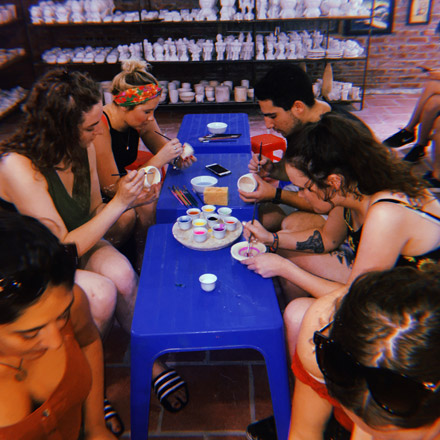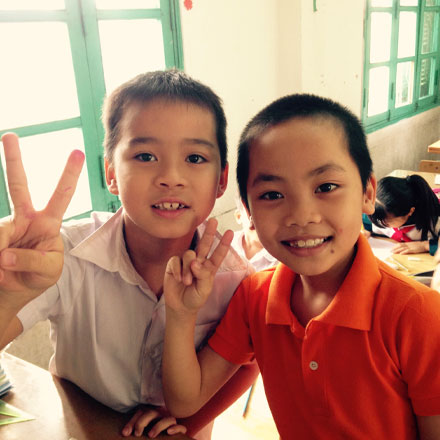If you’ve decided to teach in Vietnam through i-to-i’s internship, an exciting five months lie ahead! Taking the plunge to move to Asia also means settling into a different and wonderful culture. Although plenty of support awaits you upon arrival, there are certain things I wish I’d known before boarding that flight to make the transition easier.
1. How much should I pack?
Let’s start with the age-old conundrum. I arrived in Hanoi woefully under packed, figuring that if I didn’t know what I should bring, then I would only bring the essentials. Other interns had the opposite problem, and brought so much that they had to leave some behind after the semester.
I’d suggest opting for a happy medium: select clothes that will ensure your comfort in any weather (especially if you’re based in the north), any toiletries that aren’t stocked in Asia, and mementos from your life at home. Remember, you’re likely to be teaching in a big city, which means you can buy things as and when you need them – and for a cheaper price, too!
To break all this down, here’s an essential packing list for your time in Vietnam:
- Mosquito net and deet
- Face moisturiser (a lot of products over here contain whitening agents)
- Winter clothes
- Smart clothes for teaching
- A folder containing any photos of family/friends to incorporate into lessons
- Laptop or tablet for lesson planning
- A lightweight rain mac
- Paracetamol or ibuprofen (these are harder to find)
- A re-usable water bottle, or one with a filter that allows you to drink tap water (save money and most importantly, the planet)
Extras:
- If you’re an avid reader, buying a kindle will save you space and money in the long term
- For us women, stock up on sanitary products: tampons are harder to find and are more expensive.
2. Should I bring any teaching materials?
If you’re stressing about whether to buy a teacher book and print out a horde of word-searches, fear not! The training sessions in orientation week will arm you with plenty of game ideas for a range of ages.
As schools in Vietnam often only have a chalkboard, not many materials are needed, and flashcards for each syllabus will be provided. If, during term, you want to utilise worksheets, there are plenty of printing shops that’ll only charge you a minimal fee.
Saying this, it’s important to personalise your lessons and provide a level of relatability to what you’re teaching. Before leaving home, I packed a folder containing some realia that became indispensable later. Among these were photos of loved ones, post cards of major cities or holiday destinations, and examples of Christmas cards.
3. Should I learn any Vietnamese before I leave?
For this, YouTube will be your best friend, as your best chance of learning Vietnamese will be through listening rather than reading. As in your future lessons, the focus should be on each word’s mood-defining inflection. In English, an upward intonation at the end of “hello” or “thank you” is associated with warmth and politeness. In Vietnamese, however, a downward intonation is considered more respectful in conversation than the opposite.
As we only want to impress and be polite, this base-level phonetic difference is what I struggled to wrap my head around the most! If you keep this in mind, the rest should become easier.
4. Is any cultural research necessary?
When it comes to the topic of social customs, most of this is learnt through in-country experience. But to avoid some trial and error, here’s a brief list of dos and don’ts that I wish I’d known before arriving:
- Be aware of colour connotations before buying gifts. In Vietnam, colours having very specific meanings; I once bought my TA a bunch of yellow flowers as a parting gift, only to discover that these should only be placed on the grave of an ancestor!
- Beware of what you wear. Being close to the equator, you’ll experience your fair share of humidity, and it’ll make you never want to wear a jumper again. However, at religious sites, it’s important for both men and women to cover their shoulders and knees. Not only is it deemed disrespectful, but it could also deny you entry to some beautiful places.
- Don’t outwardly show your frustration! You’ve probably heard of the concept known as ‘face’: the idea that dignity and respect should be maintained in front of peers, no matter how heated the situation. This notion is woven into the fabric of Vietnamese daily life, and frames interactions such as bartering and market exchange. Similarly, try not to lose your temper in the classroom, as it isn’t our place to do so, and both you and your co-workers will experience a loss of ‘face’.
- Everyone will ask you how old you are! This ties back to language difference: in Vietnam, greetings are modified to respect each age group.
Most importantly, remember to be open-minded, embrace the chaos, and don’t knock eating Pho for breakfast until you try it. Hopefully, you’ll love Vietnam so much that – like me – you’ll decide to return!






